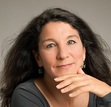Susan Rich's Blog, page 67
June 24, 2011
Wendy Call reads from "No Word for Welcome" 5 pm, this Sunday at the Elliott Bay Book Company
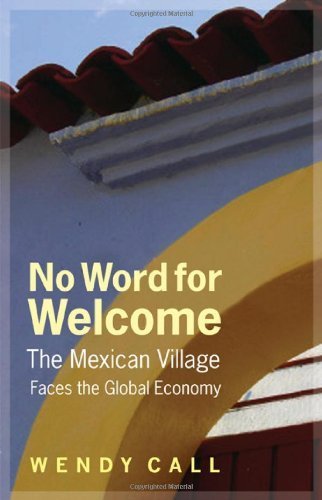
If you missed the wild launch party this week, don't worry! Wendy Call will be reading this Sunday at 5 pm at the Elliott Bay Book Company. This will be her only Seattle reading for the foreseeable future.
Published on June 24, 2011 16:49
Hedgebrook Applications Now Available On-line
 This is a cottage at Hedgebrook. This could be your cottage for anywhere from two weeks to two months. Of course you need to be a woman writer and you need to apply. Do it. Here is the link to the on-line application.
This is a cottage at Hedgebrook. This could be your cottage for anywhere from two weeks to two months. Of course you need to be a woman writer and you need to apply. Do it. Here is the link to the on-line application.I first went to Hedgebrook sixteen years ago. At the time, I was a graduate student in the University of Oregon MFA program. I spent six weeks in "Owl" during August and September of 1995. Life has never been the same. My time at Hedgebrook changed how I saw myself as a writer.
If you are thinking of applying, I am happy to answer any questions you may have. I have been on the review committee several times and have a sense of how you can optimize your chances of acceptance. Having said that, the pool is more competitive each year -- and the writers who review the work also change. If you have not been accepted before, that's no reason not to try again now. And for the first time, the application process is now on-line. Why not give it a try?
Published on June 24, 2011 03:00
June 23, 2011
Reading Poetry or Reading Prose: What's the Difference?
 Last night I gave my first prose reading at Elliott Bay Book Company. I adore this bookstore and have been lucky enough to read my poems there several times. However, last night was different. Good or bad different? I don't know. Here are some things I noticed.
Last night I gave my first prose reading at Elliott Bay Book Company. I adore this bookstore and have been lucky enough to read my poems there several times. However, last night was different. Good or bad different? I don't know. Here are some things I noticed.1. Reading prose requires more water. Now I get why authors sipping from their water glasses is not just for effect. Reading without a break for fifteen minutes is tough. Less breathing is allowed with prose.
2. With memoir there is nowhere to hide. OK so the stage is the same size no matter the genre, but it doesn't feel that way. Let me explain. My poems are never analogous with my life. Yes, I write about places I've lived and lovers I've had, but poetry allows for far more imaginative play than memoir. For me, poetry is closer to song than to a prose piece - even a lyrical prose piece. My travel essay last night concerned a love affair gone wrong. The first question from a gentle looking grandmother in the audience was "what happened next"?
3. Timing, timing, timing. Read only one essay and stay to your time? How does that work? When I prepare for a poetry reading I always allow for some improvisation. I prepare more poems than I will read so I can gauge the audience and mix it up depending on their mood. Not with prose. I had only one essay in this wonderful anthology, Best Women's Travel Writing 2011, and that was what I needed to fit into fifteen minutes. This meant reading the entire essay several times and then cutting out just a little to make the timing work. Thankfully, it did.
4. Do you have a good life? This is the second question that the very kind looking, grandmotherly lady asked me before she went out the door and into the night. Trust me, no one has ever asked me this at a poetry reading. Yet, because I read a travel essay about my own experiences, anything was fair game for the audience. I think of myself as a private person. Memoir makes this difficult. (And yes, today I like my life; it's a good one.)
5. Prose is like pecan pie. Poetry more like ice cream. I love pecan pie on Thanksgiving. The texture and unusual taste delights me, but then I'm done. Now ice cream, I could eat everyday. Ice cream comforts me with its endless variety. I feel as if I could make whole meals of ice cream cones and shakes and sundaes without ever getting bored.
There are a few more readings in the works for Best Women's Travel Writing and I am happy to be part of a great group of women writers, but then I will return (mostly) to poetry. At the moment, however, I am trying to write about a Bosnian ice cream parlor. Oddly, I can't decide: poetry or prose?
Published on June 23, 2011 10:37
June 20, 2011
The Best of Women's Travel Writing: Travelers Tales This Wednesday at Elliott Bay Book Company

Are you travelling this summer? Are you a woman or do you know one? (That should cover everyone) because if you are, this is the anthology for you (or your female friend) to take as a travel companion. I first learned of this Best Women's Travel Writing anthology a few years ago when I traveled on my own to Bosnia. I needed a book to help me feel brave in the face of endless buses and train rides. There were no essays written on Bosnia or Slovenia, but that didn't matter. I knew a woman traveling alone in the world was not as weird as all that -- and that I now had found solid proof of women travelers exploring, loving, and writing about new worlds.
I wrote Blue Gates as a way to remember my time living in Zinder, Niger as a twenty-something Peace Corps Volunteer.I tried to evoke the slow-winding rhythm of my days and the lovely strangeness that surrounded me. For example, the attractive man pictured above is a Fulani nomad. The Fulani believe fully in the expression of male beauty. Mascara plays a key part in a young man's life as does the make-up that accents his nose and cheekbones. The young men in my story: Dari, Sa-a, and Yabide are all Fulani pre-teens - their coming of age rituals still ahead of them.
I'll be reading with local writer Sara Bathum and Jocelyn Edelstein. It would be lovely to see you there!
From Elliott Bay Book's website where you should visit and buy books --- any books!Start: 06/22/2011 7:00 pmIf travel is on your mind, consider joining us for what will be a lively evening of storytelling about the discoveries, misadventures, and epiphanies of the road trip (and of writing about it). Best Women's Travel Writing 2011 (Travelers' Tales), edited by Lavinia Spalding, is the seventh installment in an enjoyable, award-winning series. Local contributors Sara Bathum, Susan Rich, and Jocelyn Edelstein will read from their work, and weigh in on the many reasons why we embark on these journeys.
 The Best Women's Travel Writing: True Stories from Around the World (Paperback)By Lavinia Spalding$18.95ISBN-13: 9781609520120
The Best Women's Travel Writing: True Stories from Around the World (Paperback)By Lavinia Spalding$18.95ISBN-13: 9781609520120Availability: On Our Shelves Now
Published: Travelers' Tales Guides,
Published on June 20, 2011 11:42
June 19, 2011
Dorothy Parker and Writers Block: "I Can't Look You in the Voice"
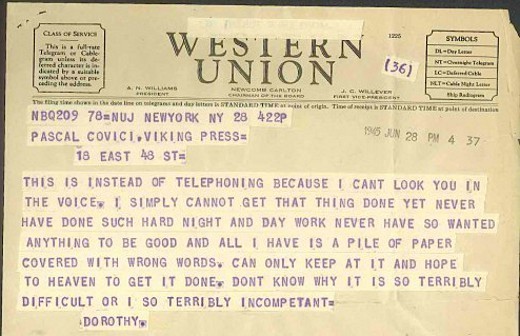
Image: Nancy Campbell
Anyone who has ever hit a wall whilst writing will find it difficult not to empathize with the dejected words of Dorothy Parker in this telegram, sent in 1945 to her editor, Pascal Covici. Such was her frustration, Parker couldn't even bring herself to ring him and explain.
This is from one of my favorite places on the web: Letters of Note "is an attempt to gather and sort fascinating letters, postcards, telegrams, faxes, and memos. Scans/photos where possible. Fakes will be sneered at. Updated every weekday." Edited by Shaun Usher.
I love everything about the simplicity of this project -- the way it works to bring telegrams, postcards, napkins scribbled with drawings, or fan letters to a wider audience. There is a deep intimacy in reading the words of letters never meant for more than an audience of one. I'm happy to know that these utterances are resurrected and given a worldwide audience. And today I'm especially happy that even Ms. Parker was sometimes at a loss for words.
Published on June 19, 2011 12:13
June 17, 2011
Tonight, Tonight -- Won' Be Just Any Night!
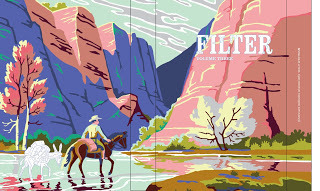 In this age of on-line everything, here is a journal that you just can't digitize. Jennifer Borges Foster, Kate Lebo, and a village of volunteers have assembled a completely hand printed, hand-bound, handsome journal in a box. Yes, in a box. Each year for the past three years, Jennifer Borges Foster has created a Filter journal from scratch, each one its own separate art object.
In this age of on-line everything, here is a journal that you just can't digitize. Jennifer Borges Foster, Kate Lebo, and a village of volunteers have assembled a completely hand printed, hand-bound, handsome journal in a box. Yes, in a box. Each year for the past three years, Jennifer Borges Foster has created a Filter journal from scratch, each one its own separate art object.I love the energy behind this project and I am honored to be included along with writers such as Yusef Komunyakaa, Martha Silano, and Stacey Levine. This is a journal we will certainly hear more from.
Come out tonight to the Freemont Abbey Arts Center and celebrate book arts and bravado --- for in this Facebook age, creating a hand bound journal is nothing short of heroic. Of course these twenty-somethings aren't stupid, here is the Filter Blog where you can follow the assemblage and celebration if you aren't in Seattle.
For more information on Filter and how to get your tickets, click here. And yes, the evening is worth the price of admission: $8 in advance.
Published on June 17, 2011 11:04
June 15, 2011
Superb Piece on Creating a Manuscript - Thanks, Ploughshares
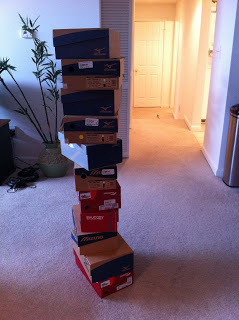
One of my first "jobs" in the literary world was as a reader for Ploughshares Journal. I would stop by the home of David Daniels and he would greet me with shoeboxes full of submissions. From these over-stuffed boxes I learned so much. I learned that hundreds, if not thousands, of people (in the two years I was a reader) cared enough about poetry to write it, but not as many seemed particularly interested in honing their craft. The letter I remember best was written in a spiraling circle on the waxy paper often used to wrap sandwiches. The poet cursed me. Or the me he imagined. He (yes, it was a he) imagined that I was a graduate student (I wasn't) and that I delighted in rejecting his poems (again, no).
I learned that a short and positive submission letter did the trick. I learned that it's the poem that counts, not the bells or whistles in the envelope (sometimes photos). And today I can thank Ploughshares -- or more to the point -- Peter Kline -- for a beautifully written piece on how one might think about constructing a manuscript. Hope you enjoy! And by the way, Ploughshares is now accepting new work on-line.
Peter Kline Searches for Voice
Lately I've been spending a lot of time reworking my manuscript, ordering and reordering, adding and removing poems, trying to shape it into something that's more than just a coherent collection. I want my book to feel like a particular kind of experience, one that develops unexpectedly as it unfolds in time, like a provocative encounter with a stranger.
There's a party, a big room with many voices, spectacle, eye candy. You've come to meet someone, but who? It's so hard to really meet anyone in these places. Your eyes browse the hipsters in line at the cash bar, lingering on fripperies, amused. Then someone crosses the room right to where you're standing and fixes you with his grin. Does he really think that line will work? You challenge it – and find, despite yourself, that you've been drawn into a meaningful conversation. His bravado complexifies into a kind of self-deprecation. His manner, at first overfamiliar, now seems a direct response to the brevity of life. Already you feel intimate with him. Will you leave the party together? No. His heart is not his own. He smooths the stray hair back from your eyes in farewell.
The best books of poetry lead us in and teach us how to read them; they are primers for themselves. Some poets do this gently, with an outstretched hand; others just toss the reader into the maelstrom (my first experience of reading The Dream Songs had something of this character!). But a well-constructed book of poems will use these waves to teach a reader how to swim. Something of what must be taught is method: each poet has a different way, a different range of ways, to establish meaning, and part of reading new poets is becoming attuned to the subtleties of their meaning-making. The difficulty of this endeavor has become much greater over the past century – many poets, in attempting to follow Pound's dictum to "Make it new," have abandoned traditional methods of meaning (coherent syntax, unified speaker, logical argument, narrative) in favor of more radically disjunctive or associative ways. Because of this, lesser contemporary poets of an experimental bent are often incoherent unless they are interpreted using one particular rubric – thus, the necessity for manifesto. These are poems that require a handbook. A great experimental poet, like Berryman or, more recently, Rae Armantrout, teaches you the rubric as you read the poems, no handbook required. Click here to continue reading Peter Kline's posting.
Published on June 15, 2011 15:52
June 14, 2011
Come One, Come All: 7:00 PM This Thursday at the Seattle Art Museum in Conjunction with Jack Straw
SAM Performs

 SAM Word
SAM Word June 16, 2011
7:30–8:30 pm
Third Floor Galleries

Produced in conjunction with local literary organizations, join us for an evening of spoken word and poetry readings in response to
Published on June 14, 2011 14:29
June 13, 2011
Neil Patrick Harris' 2011 Tony Awards Opening Number: A Poem for Our Times
This is perfect for me today -- my day off after a crazy academic and touring year.
I love how over-the-top this! It's smart, funny, offensive and so of our times.
Published on June 13, 2011 16:04
June 10, 2011
School's Out For Summer, And Now ...
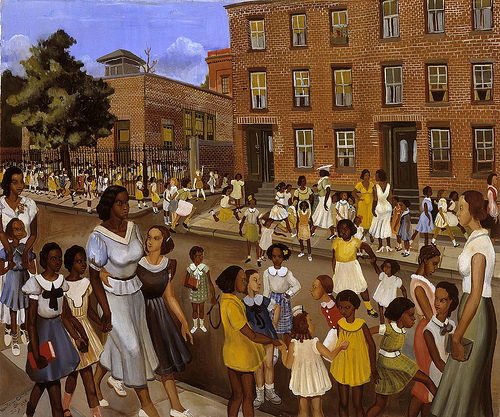 Wow. Exams proctored, papers read, and grades posted. It's always a mix of ecstasy followed by a tinge of sadness. The summer stretches out before me like a sweet blue beach blanket. The only problem? It's 58 degrees in Seattle and overcast. Still, this is perfect writing weather. My House of Sky studio calls and this afternoon I plan to see if I remember how to write a poem. The process of transitioning from writing teacher to writer is often strange. It's a strangeness I've come to know.
Wow. Exams proctored, papers read, and grades posted. It's always a mix of ecstasy followed by a tinge of sadness. The summer stretches out before me like a sweet blue beach blanket. The only problem? It's 58 degrees in Seattle and overcast. Still, this is perfect writing weather. My House of Sky studio calls and this afternoon I plan to see if I remember how to write a poem. The process of transitioning from writing teacher to writer is often strange. It's a strangeness I've come to know.This summer I hope to stay mostly in the garden and the writing studio. I have stacks of books ready to read and perhaps poems ready to write. I'll also be doing two readings and two teaching gigs. May summer last forever. Happy summer to you!
Published on June 10, 2011 10:20

